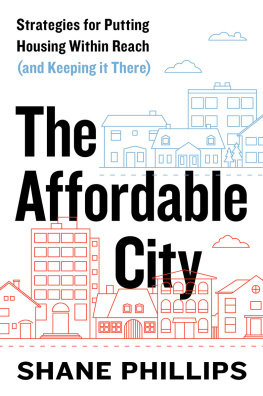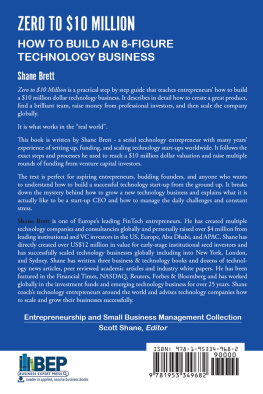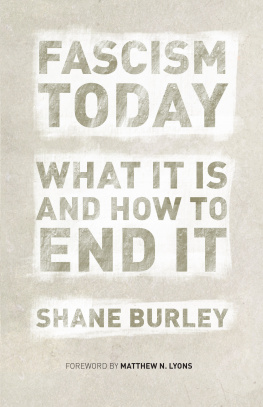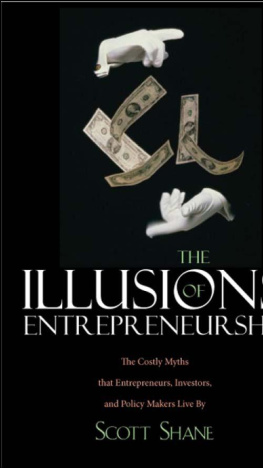Shane Phillips - The Affordable City
Here you can read online Shane Phillips - The Affordable City full text of the book (entire story) in english for free. Download pdf and epub, get meaning, cover and reviews about this ebook. year: 2020, publisher: Island Press, genre: Politics. Description of the work, (preface) as well as reviews are available. Best literature library LitArk.com created for fans of good reading and offers a wide selection of genres:
Romance novel
Science fiction
Adventure
Detective
Science
History
Home and family
Prose
Art
Politics
Computer
Non-fiction
Religion
Business
Children
Humor
Choose a favorite category and find really read worthwhile books. Enjoy immersion in the world of imagination, feel the emotions of the characters or learn something new for yourself, make an fascinating discovery.
- Book:The Affordable City
- Author:
- Publisher:Island Press
- Genre:
- Year:2020
- Rating:3 / 5
- Favourites:Add to favourites
- Your mark:
- 60
- 1
- 2
- 3
- 4
- 5
The Affordable City: summary, description and annotation
We offer to read an annotation, description, summary or preface (depends on what the author of the book "The Affordable City" wrote himself). If you haven't found the necessary information about the book — write in the comments, we will try to find it.
The Affordable City — read online for free the complete book (whole text) full work
Below is the text of the book, divided by pages. System saving the place of the last page read, allows you to conveniently read the book "The Affordable City" online for free, without having to search again every time where you left off. Put a bookmark, and you can go to the page where you finished reading at any time.
Font size:
Interval:
Bookmark:
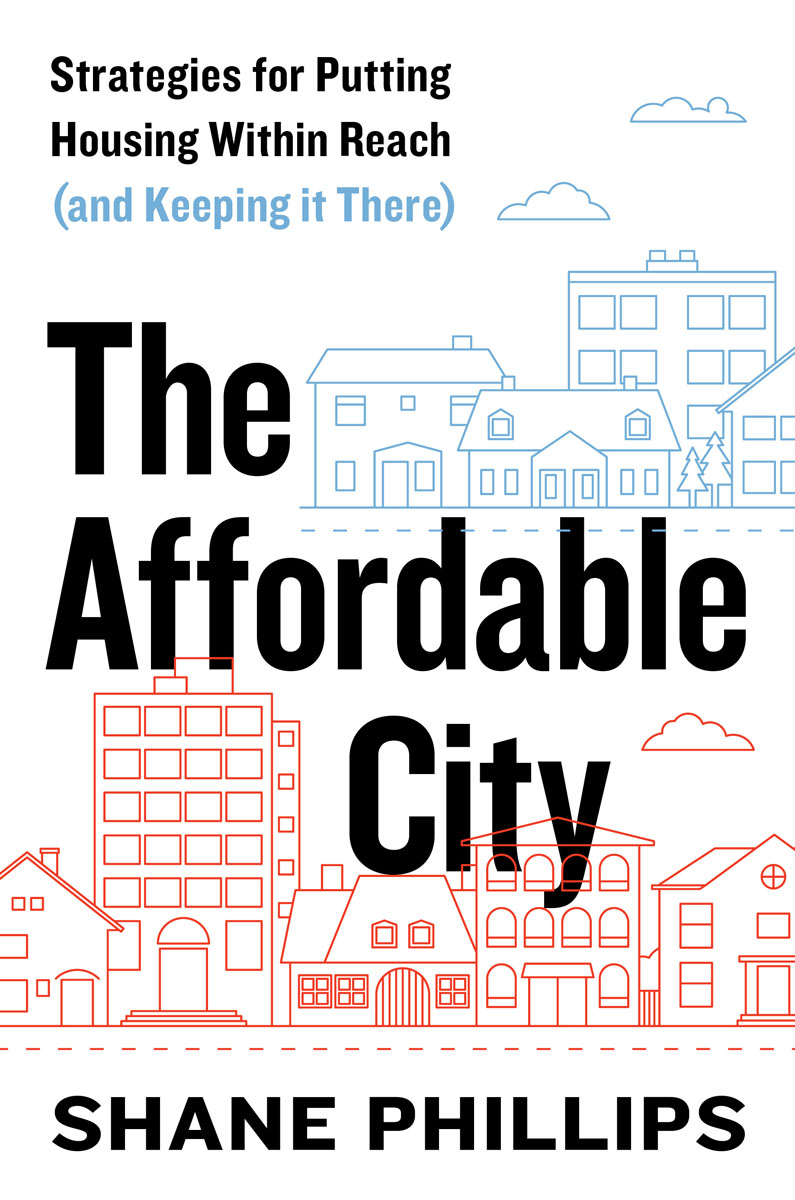
About Island Press
Since 1984, the nonprofit organization Island Press has been stimulating, shaping, and communicating ideas that are essential for solving environmental problems worldwide. With more than 1,000 titles in print and some 30 new releases each year, we are the nations leading publisher on environmental issues. We identify innovative thinkers and emerging trends in the environmental field. We work with world-renowned experts and authors to develop cross-disciplinary solutions to environmental challenges.
Island Press designs and executes educational campaigns, in conjunction with our authors, to communicate their critical messages in print, in person, and online using the latest technologies, innovative programs, and the media. Our goal is to reach targeted audiences-scientists, policy makers, environmental advocates, urban planners, the media, and concerned citizens-with information that can be used to create the framework for long-term ecological health and human well-being.
Island Press gratefully acknowledges major support from The Bobolink Foundation, Caldera Foundation, The Curtis and Edith Munson Foundation, The Forrest C. and Frances H. Lattner Foundation, The JPB Foundation, The Kresge Foundation, The Summit Charitable Foundation, Inc., and many other generous organizations and individuals.
The opinions expressed in this book are those of the author(s) and do not necessarily reflect the views of our supporters.

Island Presss mission is to provide the best ideas and information to those seeking to understand and protect the environment and create solutions to its complex problems. Click here to get our newsletter for the latest news on authors, events, and free book giveaways.

2020 Shane Phillips
All rights reserved under International and Pan-American Copyright Conventions. No part of this book may be reproduced in any form or by any means without permission in writing from the publisher: Island Press, Suite 650, 2000 M Street, NW, Washington, DC 20036.
Library of Congress Control Number: 2020931763
All Island Press books are printed on environmentally responsible materials.
Manufactured in the United States of America
10 9 8 7 6 5 4 3 2 1
Keywords: affordable city, affordable housing, homelessness, housing affordability, housing finance, housing policy, housing stability, housing subsidy, housing supply, not in my backyard (NIMBY), real estate development, rent control, tenant protections, yes in my backyard (YIMBY)

Quite a few friends (and my editor) have asked me, Who did you write this book for? My first intuition has been to reply that its for anyone who cares about housing affordability, which conveniently describes the majority of coastal US residents and quite a few in the Mountain West, South, and Midwest as well. I look forward to the book sales bonanza.
But, truthfully, thats not right. This book is really for people who prioritize affordability and community over their own agenda, ideological purity, or personal ownership of victories and losses. Its for people who dont want only to identify problems and bad actors but who are also set on enacting solutions, even when those solutions may be incomplete or incremental or may require compromise. Admittedly, and unfortunately, thats a somewhat smaller readership.
And yet, I think, its bigger than most people realize.
Most of us suffering from the high cost of housing dont care about factions, ideologies, or whose side wins the political fight of the day; we care about results. We want very simple things: homes that dont break the bank; the ability to live, stay, and thrive in the communities of our choosing; and strong, enforceable protections from abuse and exploitation.
To date, the housing policy debate in high- and rising-cost cities has been defined by its poles: if you support the development of more homes, then you mustnt care about tenants; if you care about tenants, then you mustnt support new development. But these are false choices. Cities grow; thus they need more homes. Communities change faster than some people can manage; thus they need protection.
The central argument of this book, supported by dozens of specific policies to help make it an actionable resource, is that more homes and stronger tenant protections are both indispensable. Furthermore, both of these effortswith public funding to augment themare mutually reinforcing. Each is more effective with the other. Supply, Stability, and Subsidythe themes of this bookare all integral to realizing the promise of affordable and accessible cities.
The diversity of ideas in this book reflects my own scattershot background. I never finished high school, but I was the first person in my extended family to go to college, first at the University of Washington, where I majored in biochemistry, and later at the University of Southern California (USC), for masters degrees in urban planning and public administration. Before getting my bachelors degree I worked at a grocery store, several restaurants, a city public works department, UPS, and Comcast, as a cable technician. (Please, no Cable Guy jokes.) During college I worked in a chemistry lab and a genetics lab, and after college I did tuberculosis research. I grew up in the suburbs but was then living in Seattle, and it was around this time that I began to develop an interest in cities and write about them in my blog, Better Institutions (http://www.better-institutions.com).
I moved from Seattle to Los Angeles to enroll in graduate school, and while there I worked in a city council office and later as a consultant on transportation, development, and sustainability projects. After graduating I worked on a Downtown Los Angeles transportation project, continuing to write and to grow increasingly interested in housing. As slow as progress could be, it seemed that LA and other cities were moving in the right direction on transportation. When it came to housing, it seemed to me that things were only getting worse, and I was motivated to focus my efforts there. I took a job as director of public policy for a Downtown LA advocacy organization, and there I had the opportunity to work on housing policy in what was arguably the only pro-housing neighborhood in a city of five hundred square miles.
Today I work on housing full time and then some, serving as the housing initiative project manager for the Lewis Center for Regional Policy Studies at the University of California, Los Angeles (whew), writing about how to strengthen rent control one week and how to build more market-rate homes the next. After seven years in LA, I believe Ive made every housing advocate angry at me at least once. Ive taught public policy at USC, I advocate with organizations such as Abundant Housing LA and Streets For All, and I assist with local efforts including LAs citywide housing element task force. The work genuinely never gets old.
My views on housing policy werent always so all-inclusive, and maybe thats true of you as well. In my case, I came to housing advocacy with a focus on supply, armed with endless statistics about the decades of underbuilding that plagued US cities and its consequences for scarcity, vacancies, and rents and home prices. I didnt believe that housing production could solve our affordability and homelessness crises by itself, but I didnt have much to offer beyond it. I bought into the argument that rent control was anathema to housing supply, and I had little to say about public funding and other government-led interventions.
Next pageFont size:
Interval:
Bookmark:
Similar books «The Affordable City»
Look at similar books to The Affordable City. We have selected literature similar in name and meaning in the hope of providing readers with more options to find new, interesting, not yet read works.
Discussion, reviews of the book The Affordable City and just readers' own opinions. Leave your comments, write what you think about the work, its meaning or the main characters. Specify what exactly you liked and what you didn't like, and why you think so.

